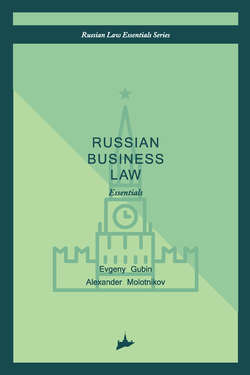Читать книгу Russian business law: the essentials - - Страница 43
Svetlana Popova[42]
Chapter 3 – Core Business Contracts
1. The Contract As a Basis for Creating Obligations
1.2. General Provisions on Contracts
ОглавлениеThe CC of the RF contains general provisions pertaining to every type of contract, and provisions regulating certain types of contracts (public contract, contract of adhesion, etc.), as well as provisions on individual types of contracts (purchase and sale contracts, rental agreements, etc.). The provisions on individual types of contracts cover the main rights and obligations of the parties, the rules of concluding a contract, formal requirements of a contract, etc.
Furthermore, the parties can conclude not only the types of contracts which are named directly in the CC of the RF, but also contracts which are not specified therein. The latter category can include contracts containing elements of several named contracts (mixed contracts), and special contracts, which do not contain elements of named contracts (unnamed contracts). Depending on the type of concluded contract, different principles can be distinguished with respect to the regulation of the contractual relationships of the parties.
Relationships under named contracts are defined by the parties, taking into consideration the rules on those contracts provided in the CC of the RF. The imperative norms governing the contract cannot be changed by the parties. When there are dispositive rules governing the contract, the parties can agree not to apply those provisions, or to establish different rules. The criteria for imperative norms have been identified in the Decision No. 16 of the Plenum of the Supreme Court of Arbitration of the RF, dated March 14, 2014.[44]
The Decision No. 16 of the Plenum of the Supreme Court of Arbitration of the RF, dated March 14, 2014, "On the Freedom of Contracts and Its Limits," was the first decision to establish the presumption of the dispositive nature of the norms governing individual types of contracts. According to the Plenum of the Supreme Court of Arbitration of the RF, the legal norms governing the rights and obligations under the contract shall be considered to be imperative, if those include a clear prohibition on adding different clauses to the contract. The norm is also of an imperative nature, if it is necessary for the purposes of safeguarding special interests protected by law (interests of the weakest party of the contract, third parties, public interest, etc.), for avoiding a great disparity between the parties’ interests. In addition, the imperative nature of a legal norm can be implied from the nature of the legislative regulation pertaining to a certain type of contract. In other scenarios, the norm should be considered to be of a dispositive nature.
With respect to the relationship under mixed contracts, or contracts which have elements of a mixed contract, the rules governing these contracts apply in respective portions, unless the parties agreed otherwise, or the rules are implied based on the nature of the mixed contract.
As for unnamed contracts, the rules on individual types of contracts provided in the CC of the RF do not apply directly. However, if the parties do not set in the contract the rules governing a particular aspect of their relationship, then the provisions on the individual types of contracts of the CC of the RF may apply by analogy (analogy of the law – Clause 1 of Article 6 of the CC of the RF).
In any of the aforementioned scenarios, the parties have the right to agree that the individual terms of the contract shall be determined by standard terms developed for contracts pertaining to the respective type, and published in the press (Article 427 of the CC of the RF). In the event that the contract does not contain a reference to such standard terms, they can be applied to the relationship of the parties as customs of trade.
The general stipulations of contract law in the CC of the RF includes provisions applicable to certain types of contracts: public contract, contract of adhesion, preliminary contract, framework agreement, option agreement, subscription contract, and the contract for the benefit of third persons.
44
See Decision No. 16, dated March 14, 2014, of the Plenum of the Supreme Arbitration Court of the RF, "On the Freedom of Contract and Its Limits," // “ConsultantPlus” Legal Directory System.
